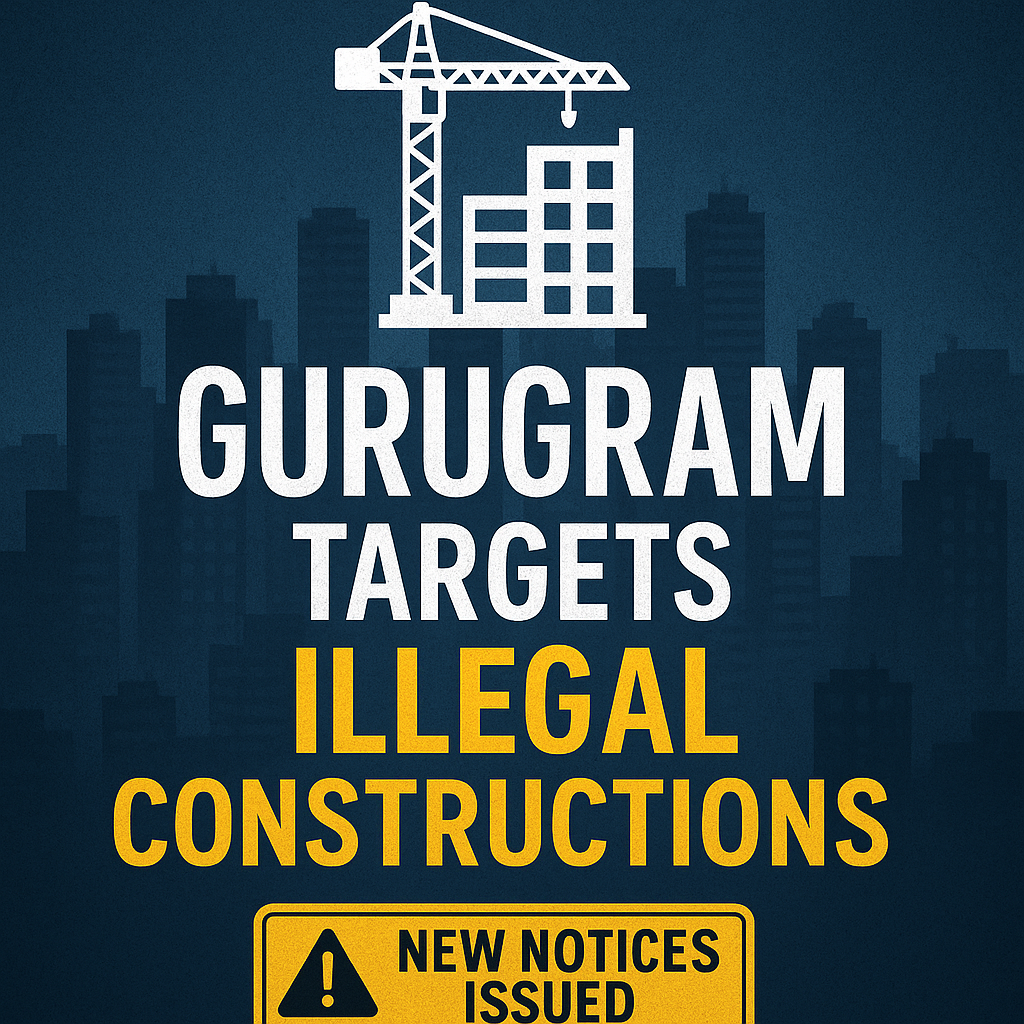🏗️ Introduction: A Wake-Up Call for Urban Compliance
Illegal constructions in Gurugram are becoming a major concern, threatening both civic order and the safety of residents. In a significant move, the Gurugram Metropolitan Development Authority (GMDA) has issued 72 notices to builders and property owners for violating approved building norms.
This large-scale crackdown highlights the growing concern over unauthorized structures that compromise safety, aesthetics, and long-term city planning.
But what triggered these notices? Who is impacted? And most importantly, what does this mean for future construction in Gurugram?
Let’s explore this in detail.
📢 GMDA’s Action – What Sparked the Crackdown?
On April 23, 2025, the GMDA’s enforcement wing conducted inspections across Sector 37C, Sector 92, New Palam Vihar, and Vatika India Next, among others. Following these inspections, 72 properties were found to have deviated from approved building plans.
Violations included:
- Constructing additional floors without permission
- Encroachment on public roads
- Improper setback distances
- Illegal commercial activity in residential zones
👉 Read the official GMDA notice here
This action came after repeated complaints from residents and RWAs regarding blocked access roads, waterlogging, and structural hazards due to unauthorized modifications.
🧱 Common Types of Illegal Construction in Gurugram
According to local authorities and urban planners, the most common building violations include:
- Unauthorized Floors: Building 4–5 floors on plots sanctioned for only 2–3 levels.
- Basement Conversions: Turning basements into commercial offices or rental units without approvals.
- Setback Violations: Ignoring distance requirements from roads or neighboring plots.
- Commercial Use in Residential Zones: Shops, gyms, and coaching centers operating in residential buildings.
- Lack of Structural Approvals: Builders skipping safety certifications or soil testing.
🧑⚖️ Legal Consequences for Builders and Owners
Receiving a GMDA or DTCP notice is serious. The legal consequences may include:
- Demolition orders for illegal portions
- Hefty fines (₹50,000–₹5 lakh or more)
- Registration blacklisting of repeat offenders
- Disqualification from future projects
In some cases, FIRs are filed under Section 10 of the Haryana Development and Regulation of Urban Areas Act, 1975.
Builders not only risk their licenses but also damage their brand trust among buyers.
🏘️ How It Affects Homebuyers
If you’re a current or prospective homebuyer in Gurugram, illegal constructions can impact you directly:
1. 🧾 Legal Risk
If you’re living in or planning to buy a property under notice, you may face eviction or demolition without compensation.
2. 💸 Financial Risk
Illegal floors or shops sold without clearance might not be eligible for loans, insurance, or resale — affecting your investment.
3. 🛑 Delay in Occupancy Certificates
Properties with violations often don’t receive OC (Occupancy Certificates), which blocks utility connections and resale registration.
🧠 Expert Opinion: Urban Planners Speak
According to Dr. R.K. Sharma, a senior urban planner with NCRTC:
“The pace of unauthorized construction in satellite cities like Gurugram is alarming. Builders exploit legal loopholes and poor enforcement. This crackdown is overdue but necessary.”
Meanwhile, residents in high-rise townships are calling for stricter third-party audits and regular inspections by DTCP and GMDA.
🧾 RERA’s Role – Are Buyers Really Protected?
The Real Estate (Regulation and Development) Act, 2016 (RERA) was meant to safeguard buyers from such violations. However, the implementation remains patchy.
While RERA mandates that all new projects must be registered and plans approved, many developers:
- Skip registration for independent floors
- Under-report floor area ratios (FAR)
- Delay updates on construction progress
Buyers should verify RERA registration before booking and check for uploaded approvals.
👉 Check Gurugram project status on RERA Haryana
🛑 Not Just a Gurugram Problem: Nationwide Crisis
Gurugram’s issue is reflective of a national pattern. From Noida and Ghaziabad to Bengaluru and Pune, illegal floor additions and land misuse plague many urban hubs.
According to a 2024 report by the National Institute of Urban Affairs (NIUA), over 18% of residential construction in Tier-1 cities is unauthorized or partially regularized.
Therefore, urban reform must become a policy priority across India.
💡 How Can Buyers Protect Themselves?
Before buying any flat, builder floor, or villa — especially in high-demand sectors like 67, 92, or Golf Course Extension Road — ensure you:
- ✅ Check RERA registration and sanctioned plans
- ✅ Ask for building safety & fire NOCs
- ✅ Get legal verification of ownership/title
- ✅ Verify OC/CC (Occupancy or Completion Certificate)
- ✅ Consult a property lawyer for builder-buyer agreement
Buyers must treat real estate like due-diligence-driven investment, not just emotion-driven purchases.
🧠 Tips for Builders to Stay Compliant
For ethical developers, these best practices help stay on the right side of the law:
- Hire qualified urban architects and submit approved floor plans
- Display approval certificates at construction sites
- Stay within sanctioned Floor Area Ratio (FAR)
- Schedule periodic safety audits
- Update project status with RERA every quarter
A transparent, compliant builder gains long-term trust — and avoids expensive court battles.
📅 What Happens Next?
GMDA has stated that builders and owners will be given a limited timeline to respond and either rectify the violations or face further action.
Moreover, the department is launching a GIS-based construction monitoring tool that maps unauthorized structures in real-time.
Civil rights groups have also asked for a public list of blacklisted developers to prevent homebuyer exploitation.
✅ Conclusion: A Much-Needed Cleanup for Gurugram’s Growth
This crackdown by GMDA signals a zero-tolerance policy toward unauthorized construction. While it may temporarily disrupt builders and owners, it sets the foundation for more transparent and regulated urban development in Gurugram.
Homebuyers must now be smarter, more aware, and legally cautious. Builders, too, must shift toward full compliance — not just for legal safety, but to rebuild trust in a market that’s maturing fast.
Gurugram’s real estate future can be bright — but only if rules are followed and enforcement stays strong.


